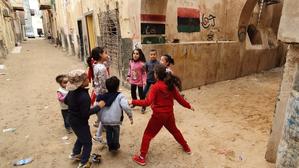 In this Jan 14, 2020 file photo, Libyan children play on January 14, 2020 in the Libyan capital Tripoli, controlled the UN-recognised Government of National Accord (GNA). (MAHMUD TURKIA / AFP)
In this Jan 14, 2020 file photo, Libyan children play on January 14, 2020 in the Libyan capital Tripoli, controlled the UN-recognised Government of National Accord (GNA). (MAHMUD TURKIA / AFP)
TRIPOLI - The United Nations Children's Fund (UNICEF) and the World Health Organization (WHO) on Monday said that more than 250,000 children in war-torn Libya face the risk of developing vaccine-preventable diseases.
The lives and health of over a quarter of a million children under one year of age in Libya are at risk from vaccine-preventable diseases due to critical shortages in vaccine supplies
from UNICEF and WHO's joint statement
"The lives and health of over a quarter of a million children under one year of age in Libya are at risk from vaccine-preventable diseases due to critical shortages in vaccine supplies," UNICEF and WHO said in a joint statement.
The situation is made worse by the ongoing armed conflict and the COVID-19 pandemic, as well as the disrupted health care services, regular power cuts, shortages of safe water and closure of schools, the statement said.
ALSO READ: Libya govt, Haftar's forces dim hopes of salvaging UN ceasefire talks
"There is an urgent need to ensure an uninterrupted flow of funds for vaccine procurement to cater for the current shortfall," said Abdel-Rahman Ghandour, UNICEF Special Representative in Libya. "UNICEF renews offering its procurement services to the Government of Libya to procure WHO prequalified vaccines at competitive prices and have them delivered to Libya urgently."
Due to years of armed conflicts and instability, Libyan authorities have been struggling to provide basic services for the people, in particular proper education and healthcare.
The east-based army has been fighting the UN-backed government to seek control of the capital Tripoli since April 2019, and the conflicts have killed and injured hundreds of civilians and displaced more than 150,000 others.
READ MORE: UNICEF: Largest number of children displaced in 2019


